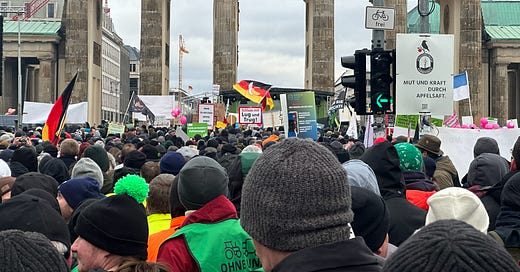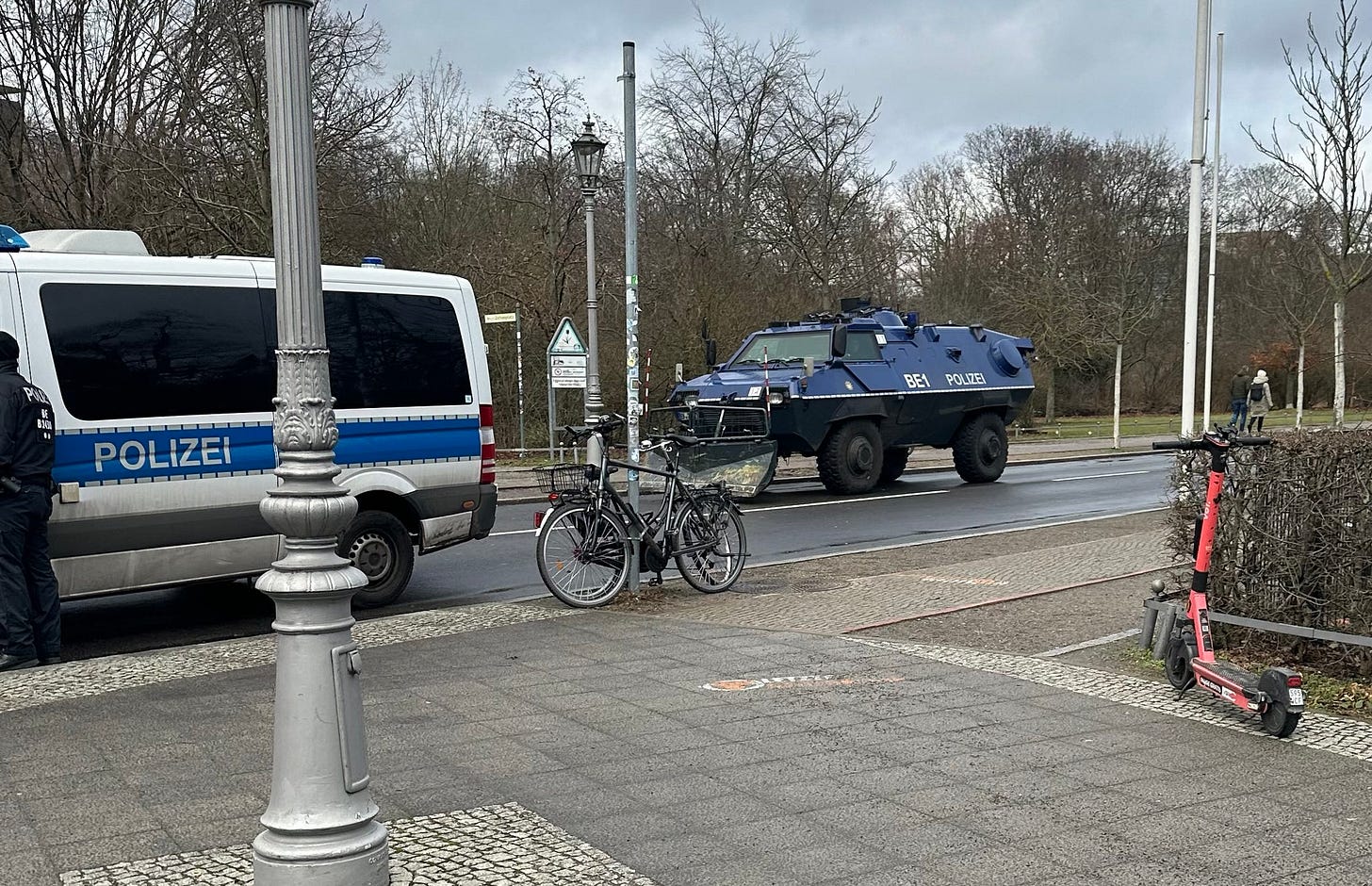How the leaders of the Great German Farmers' Protest are committed to neutralising their own movement, and what the farmers must now do if they want anything to change
A report on the 15 January farmers' demonstration in Berlin
There are once again too many pictures for many email services. Please click over to my website if you want to read the full post.
Yesterday tens of thousands of farmers, tradesmen and truckers, with at least 5,000 tractors and other vehicles, gathered on the Street of 17 June and adjacent boulevards. I could hear their horns from my room all the way on the other side of the Tiergarten throughout late Sunday night and early Monday morning. It was hard to sleep.
As soon as the sun rose, I climbed to the top of the Victory Column, and saw nothing but tractors in every direction.
This was the eastward view towards the Brandenburger Tor:
Here’s the westward view looking towards the Technische Universität:
To the south on Hofjäger Allee:
Northwest along Altonaer Str.:
The day was cold and windy, but the mood was good. The police had quietly positioned water cannons and other crowd suppression equipment on side streets …
… but it was obvious that none of it would be used. Some papers are now eagerly reporting that “multiple arrests” occurred, by which they mean police detained about two dozen people. I’d say that’s the minimum you can expect at an action of this size, and because various bad actors are trying to tell lies, I want to be very clear: There was no confrontation between protestors and riot police, the officers were restrained and the worst I saw anybody do was set off some fireworks…
…and climb some light poles:
Around 11am there began the march down the Street of 17 June towards the stage on the Brandenburger Tor, where protest leader Joachim Rukwied, President of the German Farmers’ Association, and Finance Minister Christian Lindner were set to speak.
Along the way I saw the media that was missing on Sunday, including camera crews from Welt and Das Erste. Of course none of them bothered to interview any participants. I also met a press photographer; he came with me to the top of the Victory Column to get photographs of the crowd, but I was the only one of us who ended up taking any pictures. He had one look at the overflowing boulevards, declared there were no good shots, and quickly descended for more street-level photos. I understood this better upon reading the press coverage yesterday evening: Major news outlets are insisting, via police sources, that only 8,500 protestors attended – probably 30% of the true number. From the beginning, I guess, the press hoped to downplay the size of the protest.

I had no illusions that either Rukwied or Lindner would have anything good to say. The former spent the days before the protest railing against “radicals” and singing hymns to “democracy” and the “ballot box”; the latter gave a speech on 6 January telling the farmers to go home.
The question was merely how bad these men would be, and I regret to report that both of them were as terrible as possible. You must remember that there is one way – and only one way – for the protest to succeed: The farmers have to adopt an inclusive political programme with broad appeal, and their goal must be the resignation of the Scholz government and new elections. While the farmers are a well-organised and influential segment of society, there aren’t that many of them, which is why the government alighted upon their plan of increasing farm-specific taxes to plug their budgetary hole in the first place. If the farmers confine themselves to issues like the diesel tax hike, they’ll make themselves irrelevant. Even the farmers I talked to seemed not to care that much about diesel subsidies; they have a wide array of much more serious and relatable concerns. The vision and the strategy are there, but their leadership is wholly compromised.

Rather than embrace the grievances of the farmers they summoned, Joachim Rukwied and the German Farmers’ Association are determined to shut them down. Yesterday, Rukwied insisted that the protest is solely about the diesel tax increases, even contradicting some of his fellow speakers on this point. He complained bitterly that the press had called his movement right-wing. He explained that “democracy” is all about “conversation” and “compromise,” and he advised everyone to leave Berlin and call their elected representatives. In other words, he did everything deliberately and precisely wrong. He must know that, if the farmers follow him on this path, they won’t get their way even on agricultural diesel; the government will insist on these taxes if only to humiliate them.
After three further speeches, the most egregious from Theresa Schmidt, who chairs something called the Federation of German Rural Youth and who has a peculiar talent for delivering grating schoolmarm lectures about dEmOCraCy, it was Finance Minister Christian Lindner’s turn to speak. The crowd weren’t inclined to hear a word from him, but Rukwied called for silence and they regrettably complied. Lindner proceeded to tell the demonstrators, with Rukwied at his side, that the diesel tax hike isn’t going anywhere, but he did promise to “de-bureaucratise” the regulatory apparatus so that the farmers might enjoy “more freedom.” The farmers were unimpressed, but they let him hold forth for a full twenty minutes. As thanks for their forbearance, they may read outraged reports across the media today about what a terrible time Lindner had trying to shout over all the booing and whistling.
On one point, however, Lindner was totally right. He said the protests were clearly about much more than diesel taxes, and here alone Rukwied contradicted him, again insisting on his tiresome self-neutering line that 30,000 people assembled in Berlin to protest taxes on agricultural diesel and nothing else. He said this in front of thousands of truckers and tradesmen, whom the tax hikes do not affect. He said it before a sea of placards venting fury at the present state of German and European politics in the broadest possible terms:



In his concluding remarks, as Rukwied said yet again that he wanted only the “Rücknahme,” or withdrawal, of the tax increase, a group of angry farmers behind me began shouting that they want not “Rücknahmen” but “Rücktritte” – that is, resignations. They must now realise that Rukwied will not help them in this.
This morning there were still tractors on the Street of 17 June, so maybe there is yet hope. In any case, I think it’s important to remember what’s feasible here. Contrary to the expectations of some readers, I don’t think this or any protest can bring down the German state or realign European politics. Street activism is far from the only ingredient necessary to achieve a transformation on that scale. In the DDR there was at least an outside – an immediate alternative regime, in the form of the West, to which activists could appeal and from which they drew support. There is nothing like that for us now. What a well-supported protest like that of the farmers can do, is hurt the crisis-stricken Scholz government even more, increase the punishment for their failures and, if they are persistent enough, force new elections. That is far from everything, but it is not nothing either. Since the energy crisis, Germany has entered an accelerating process of deindustrialisation; there are real livelihoods at stake here, and it’s worth doing everything possible for any chance of moderating the destruction, however slight.
At the same time, it’s plain that the unions and organisations like the German Farmers’ Association are hopelessly compromised. As valued reader Andreas Stullkowski points out, Rukwied is fully mobbed up with the present state and corporate establishment. He’s held paid advisory positions for the state-owned investment bank KfW, for Messe Berlin, for the German sugar producer Südzucker and for BayWa. His entire purpose is to channel the political discontent of the people he nominally represents along useless paths. If the farmers want anything to change, they’ll have to disregard his calls to capitulate and press on under their own steam.













Is it OK for me to note that German farmers seem to protest, well, I don't know how to say this tactfully, efficiently?
I am a fan of the farmers. They are standing up for what is logical, and defying the insane sacrifices being offered on The Ridiculous Altar of the Climate Catastrophe Church.
Good for them. How much longer are we going to put up with these craven jack offs flying their private planes to Davos and Dubai for COP9million, to snack on caviar and $10,000 per night hookers, while telling the little people we cannot have beef or drive our cars because, you know, "carbon?'
They have gone from annoying mosquitoes to damned evil.
Wonderful as this was, I fear it will amount to nothing, as in 1524 it will be neutralised by the system. Those bad actors in power (almost all of them) don't really care. Their pensions are secure and they'll always be offered comfy jobs once they leave office. There is only one long term solution: The system will crash under the weight of its own evilness and then we can rebuild. But it will be a long, hard and destructive path.